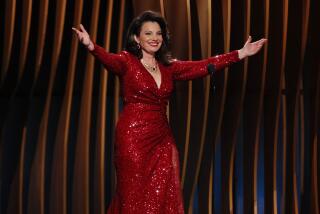Melissa Gilbert Is Elected to Lead SAG
After trouncing fellow 1970s TV star Valerie Harper on Saturday in balloting for president of the Screen Actors Guild, actress Melissa Gilbert now faces the daunting task of trying to heal a union whose bitter election mirrored its chronic infighting.
Gilbert, whose election in November was nullified because of alleged election irregularities, received 21,351 votes, or 56.6%, in the rerun election, compared with Harper’s 12,613, or 33.4%. The turnout was a record for a SAG presidential race. Two other candidates, Angeltompkins and Eugene Boggs, pulled in slightly more than 3,000 votes combined.
“I’m very upset we had to go through this again,” Gilbert said early Saturday after learning of the results. “But the silver lining is that so many members voted in this election.”
Gilbert, 37, said the election clears the air at SAG, allowing its top officials to resume trying to tackle the union’s problems, including an effort that starts in May in which the union will insist that producers hire actors under SAG contracts even when filming abroad.
In a statement after the results were made official, Harper, best known as Rhoda Morgenstern on “The Mary Tyler Moore Show” and “Rhoda,” did not mention Gilbert by name, but thanked supporters.
“In this election--rerun in a fair and uniform manner--the real winner is the democratic process,” she said.
Despite an aggressive campaign, Harper, 61, was unable to convince members that her opponent allegedly was too cozy with agents, studios and other Hollywood unions at SAG’s expense.
Gilbert’s margin of victory far exceeded what it was in November, when she pulled in 45.3% of the vote compared with Harper’s 39.4%.
Starting at noon Friday, the vote count had been expected to end early in the evening. But the pace inside the James Cagney boardroom at SAG’s Mid-Wilshire headquarters was clearly slowed by the avalanche of votes.
The 37,742 ballots cast represented more than 41% of the members eligible to vote, nearly double the typical turnout for most SAG elections.
In addition, counting was slowed by some equipment snafus and extra caution by election officials wanting to make sure there was no repeat of November’s controversy.
Gilbert’s election to the two-year term wasn’t formally announced until shortly after 1 a.m. Saturday.
“We erred on the side of caution to make sure this was perfect,” said Ira Sidowsky of Optimum Solutions Corp., which designed the technology used by the American Arbitration Assn., which oversaw the election.
In recent weeks, the campaign had deteriorated so badly into name-calling by supporters of each side that one prominent actor, James Cromwell, likened it to “a cat fight.” At one point, Harper supporter Elliott Gould called actor Mike Farrell, a Gilbert partisan, “a slug” during a rally.
The wounds may not easily heal, presenting Gilbert with perhaps her biggest challenge in ensuring that actors are well represented amid the continuing corporate consolidation of the entertainment industry.
SAG’s factional disputes frequently have been played out messily in public. “You don’t even have to watch the soap operas anymore,” said actress Tess Harper (no relation to Valerie Harper). “Just read about SAG.”
The new election, which cost about $115,000, produced an identical outcome to November’s vote, which many SAG members argued was unnecessary to rerun. In two other races, Gould again was elected recording secretary and Kent McCord won again for treasurer.
Gilbert, best known as Laura Ingalls in “Little House on the Prairie,” was two months into her term as president of the 98,000-member guild when a SAG elections committee upheld a challenge from Harper and other members who complained that last fall’s vote was tainted.
The committee ruled that the integrity of the election was compromised when New York members were given two extra days to vote, and ballot envelopes sent to New York members contained no signature lines. The company hired to run that election was dismissed and SAG employees were publicly chastised for their actions.
But Gilbert supporters countered that the decision to overturn the election was really a coup attempt by Harper supporters, including the committee that scrapped the results.
Led by former “MASH” actor Farrell, Gilbert supporters immediately pounced on the decision and made it the central campaign issue.
They dubbed Harper’s camp “the refuse to lose ticket,” arguing that the violations were inconsequential, that the election followed past procedures and that Gilbert’s victory was fair and unaffected by the extra two voting days given New York members. Gilbert backers petitioned the Department of Labor to overturn the decision to scrap the election. Though the department is still investigating, the issue is presumably moot, given Saturday’s outcome.
A volunteer position, SAG’s president is the most visible face in Hollywood representing actors. Past presidents have included Charlton Heston, Patty Duke, James Cagney and Ronald Reagan.
But unlike the days when those actors headed SAG, the union today is a balkanized collection of actors with varying interests, including stars, middle-class actors who work sporadically, dancers, stunt people and background actors. Roughly nine out of 10 actors are unemployed at any given time, and most don’t earn a full-time living. Thousands more SAG members perform infrequently or no longer act at all.
In addition, a large bureaucracy with a staggering 107-member board also has burdened the union. SAG has been aggressively trying to reorganize more efficiently, recently agreeing to a plan that will eventually trim its board size to 69 members.
Veteran Hollywood labor leader Brian Walton, SAG’s chief negotiator in last year’s contract talks with studios and a former Writers Guild of America executive director, said SAG’s volatile board needs to take the initiative in trying to heal the union.
“It needs to be in sync, and the board needs to come together,” he said. “It needs some sort of plan for unity. It can’t work if people are going to pound on each other and accuse each other of wrongdoing and evil.”
Harper had tried to make a heated campaign issue out of a tentative agreement between SAG and agents that would allow such things as limited investments by advertising companies in talent agencies.
The deal, which Gilbert supports and helped negotiate, includes financial sweeteners in the form of money for SAG’s health and pension fund, a commitment to help battle runaway production to foreign countries and establishment of a special fund for actors whose agents fail or misappropriate funds.
Harper vehemently opposed the deal, arguing that it creates conflicts of interest for agents. Saturday’s election results clearly bode well for passage of that agreement, which SAG’s board will consider Monday. Should it approve the agreement, the membership will be asked to ratify the document.
But given the recent rancor within SAG, and opposition by such prominent actors as Richard Dreyfuss, nothing seems assured.



